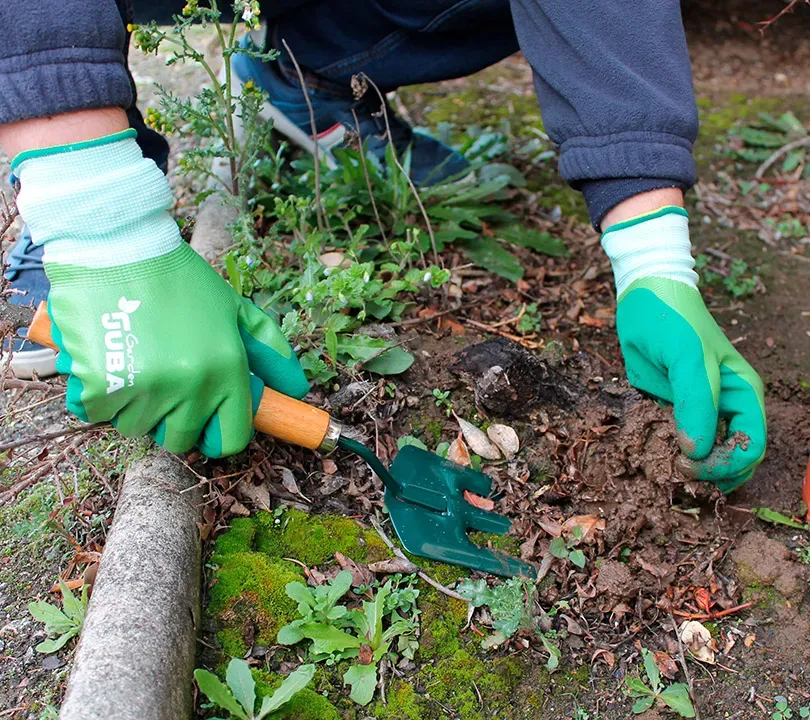Actualidad
How to choose the best disposable gloves
Nurses, hairdressers, dentists, cleaners and food handlers are just some of the people who use disposable gloves in their daily work. Nowadays, you don't need to have one of these specialisations to have a box of disposable gloves at home to handle chemicals when cleaning, cleaning fish or applying hair dye, among many other everyday situations. In fact, the CDC (Centers for Disease Control and Prevention) recommends the use of gloves for household tasks to maintain hygiene and ensure optimum safety.
As with any other safety glove, the Juba catalogue includes a wide range of disposable gloves so you can choose the one best suited to each task: material used, powdered or powder-free, different thicknesses, weight, etc.
Below we've put together a series of tips from our experts to help you buy the ones that best suit your needs.
Let's get started!
Types of disposable gloves and materials
Before buying disposable gloves, the first thing to define is their intended use. This type of personal protective equipment (PPE) is used to protect against possible infections, chemical products or when handling foodstuffs, and therefore meets very different needs, or even mandatory regulations.
In terms of materials, a distinction can be made between:
- Disposable latex gloves: a natural rubber extracted from tree bark that gives gloves high abrasion resistance and superior grip in wet and dry applications, without the presence of oils. Latex is also suitable for food handling. And, of course, it offers excellent puncture resistance and durability. The user will experience an extraordinary feeling of softness and flexibility, although this material tends to cause skin irritations in people allergic to it. Juba's references with this material are as follows: PP2328, 530 and 532B.
- Disposable vinyl gloves: economical, but not very tactile. During handling, they are more resistant to punctures than latex gloves. The Juba catalogue includes references 550 and 550B, which are certified for food use.
- Disposable nitrile gloves: this is the most common type of single-use glove. They offer high strength and durability, as well as excellent grip and chemical resistance. In most cases, they are ideal for food use. That's why Juba has a wide range of references made from this material. Among the most popular: 570/570NR; 576BL ; 573 NR FARM300 with 300mm length, a special glove for livestock or 580/H580NR/H580MG, a model with a flake design to offer great grip.
Powdered or powder-free?
There's no doubt that a disposable glove containing talc is much more comfortable to put on and take off. The problem arises when regulations prohibit their use, in many cases because the contamination they can cause is a serious problem in doctors' surgeries, laboratories or operating theatres.
With regard to glove thickness
The thicker the glove, the greater the protection and durability, but there is a loss of feel. Depending on the risks to which the user will be exposed with this glove, the appropriate thickness will also have to be chosen. In the Juba catalogue, there are numerous options ranging from disposable gloves with a thickness of 0.07 mm to 0.28 mm, as is the case with the extra-thick 532B glove, certified for mechanical and chemical hazards. In this news item, you can find out more about the gauges (thickness) of work gloves.
Size guide for disposable gloves
The glove must fit the hand for correct handling, so choosing the right size is crucial. Of course, with any type of safety glove it is important to be clear about the size of the hand, even more so in the case of disposable gloves. If you choose a smaller size than necessary, the glove will be under more stress and can break more easily, as well as creating undue fatigue from the pressure on the hand. Conversely, if the glove is larger than it should be, the glove will result in a loss of tactility for the wearer. Juba's disposable gloves are available in sizes XS/6 to XXL/11. Even those who require a longer length to protect not only the hand, but also the wrist and the beginning of the arm, can find disposable gloves with a longer length (30 cm) for a higher level of protection against infection, such as 573NR FARM 300.
With a few exceptions, the vast majority of disposable gloves in the Juba catalogue are ambidextrous. This is a particularly cost-effective advantage, since if either the left or right glove breaks, it can be replaced by another unit without having to replace the entire pair.
More options? There are times when wearing different coloured gloves can prevent cross-contamination between different tasks or departments within the same company. This is of vital importance in industries such as the food industry. These colour codes can help the occupational health and safety manager to visually identify the correct use of disposable gloves in a quick and easy way.

Advantages of using disposable gloves
The benefits of disposable gloves include excellent fit and sensitivity, as well as protection against infection, chemicals and food handling, among others.
Without a doubt, the advantages of single-use gloves are very important depending on the activity for which they are intended:
- In laboratories, to avoid contamination of samples and to protect against hazardous chemicals, nitrile gloves are preferable, as they offer higher chemical resistance and lower risk of allergies.
- In the medical and dental field to prevent transmission of infections and protect staff and patients: nitrile or latex gloves are the most common choices due to their high puncture resistance and snug fit.
- In the food industry to maintain hygiene and prevent cross-contamination of food: vinyl, nitrile or polyethylene gloves are suitable choices, these materials are safe for food contact and ensure an effective barrier.
- In the cleaning and disinfection of rooms to protect hands from aggressive chemicals and reduce the risk of spreading germs: nitrile gloves are ideal due to their chemical resistance and durability.
- In the chemical and manufacturing industry to protect hands from irritants: nitrile gloves are recommended for their chemical resistance and durability.
- In beauty salons to maintain a hygienic environment and protect hands during treatments: nitrile or vinyl gloves offer a good balance between resistance and sensitivity to touch.
The benefits of using single-use gloves are many, but it is important to remember that they should never be reused. The procedure for using single-use gloves recommends:
- Clean and dry hands before putting on gloves.
- Check them carefully before use.
- Avoid wearing jewellery and long fingernails.
- Remove gloves promptly if they are damaged or have imperfections.
- Dispose of them in the appropriate waste container.
- Wash hands.
- Never immerse hands with disposable gloves in chemicals (in this case, use the most appropriate chemical gloves).
Click here to view the entire Juba disposable gloves catalogue.




